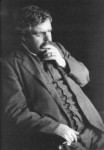Continuing our Summer Quotation Series from Hannah Eagleson. The second quotation in this series comes from G. K. Chesterton, good-humored apologist and writer: A child kicks his legs rhythmically through excess, not absence, of life. Because children have abounding vitality, because they are in spirit fierce and free, therefore they want things repeated and unchanged. They always say, "Do it again"; and the grown-up person does it again until he is nearly dead. For grown-up people are not strong enough to … [Read more...] about Quote: Chesterton on Childlike Delight
